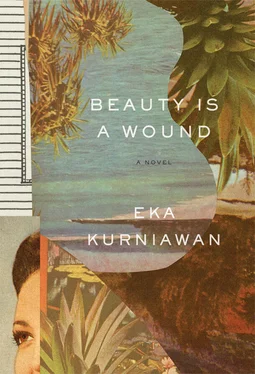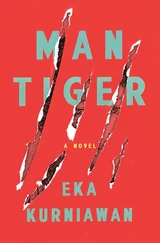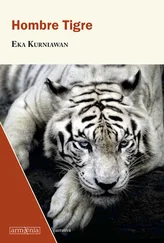“Praise God,” Shodancho said. “That position is only good for those who really want it.”
While all the citizens of Halimunda were saddened to learn he’d been replaced, Shodancho was floating on unimaginable joy.
The Army for the Safety of the People was then renamed the Army for the Salvation of the People. They had just switched all of the nameplates when the news arrived: The Army for the Salvation of the People would now be called the Army of the Republic of Indonesia.
“Are we going to go to war against Indonesia?” asked Major Sadrah.
Shodancho laughed and shook his head. “There’s no need,” he said comfortingly. “As a new country, we’re just now learning how to come up with names.”
The Japanese army had not even left yet and the people had not yet had the chance to experience an era of peace when Allied planes began flying in the Halimunda sky. In just a few days, English and Dutch troops arrived. The KNIL prisoners of war were freed and rearmed themselves and began stripping the native army of their weapons. Shodancho immediately took emergency measures, calling all the soldiers back into the forest. This time he sent them out in the four compass directions, himself leading the troops that would fortify the jungles in the south. He decided to fight another guerrilla war, this time against the Allied troops and especially the NICA, the Netherlands Indies Civil Administration. But it wasn’t just the guerrillas who went to the jungle; civilians, the majority of them young men, trailed after, swearing their loyalty to Shodancho. He split up all of his soldiers so that they could each lead a small unit of guerrillas, mostly made up of these civilians — some were the same men who raped Dewi Ayu and her friends before the English soldiers arrived.
This new guerrilla war lasted two years, and the guerrillas experienced the pain of defeat more often than victory. But even though they knew he was in the jungle on the cape, the KNIL soldiers never found the man they hunted: Shodancho. The jungle was filled with guerrillas, who knew the region better than anyone, sheltering in the old Japanese fort prisons. The KNIL soldiers, aided by the English, never had the courage to enter the jungle: they chose to hold their positions in the city. And for their part the guerrilla soldiers found it difficult to enter Halimunda. The KNIL soldiers blocked the flow of food and weapons, but that was pointless because the guerrilla soldiers planted their own rice fields in the middle of the jungle, and they were already accustomed to making war without ammunition. They tried conducting air raids, but the Japanese had taught the guerrillas how to evade those.
Shodancho further developed his guerrilla techniques, finding the best ways to camouflage and infiltrate; he could appear suddenly and disappear just as swiftly, sought even by his own men after he had disguised himself.
“It’s different from a game of hide and seek,” he said, “because the moment a guerrilla is found, he’s dead.”
This went on until Shodancho got news that stopped all the battles: the Netherlands had acknowledged the sovereignty of the Republic of Indonesia at the negotiating table. He found this quite annoying — the republic had already declared its independence four years before, but the Netherlands was only now acknowledging the fact, and for that they were simply being allowed to leave.
“It’s as if this entire war was completely meaningless,” he said dejectedly.
Even so, with his core guerrilla troops, Shodancho emerged from the forest. Their appearance was welcomed joyfully by the city folk, because he was still their hero. People waved colorful flags by the side of the road as Shodancho rode in on a mule, not paying any attention to the overenthusiastic welcome, and headed directly for the port. There the Dutch soldiers and civilians were preparing to board the ship that would carry them all home. Shodancho approached the KNIL commander, who was delighted that he could finally see his enemy. They shook hands warmly and they even hugged.
“At some point we will make war again,” the commander said.
“Yes, if the queen of the Netherlands and the president of the Republic of Indonesia allow it.”
They then parted at the gangway. Shodancho remained standing on the dock after the stairs had been hauled up and anchor lifted, while the commander stood at the railing. When the engine could be heard roaring and the ship began to sway, they both waved.
“Sayonara,” Shodancho said finally.

The end of the war brought a strange hush, the sort that falls over people when they retire. For a few days Shodahncho killed time in his old shodan ’s headquarters, on Halimunda beach. During the day all he did was trim the grass and feed it to his mule, or fish in the little nearby stream, until finally he gathered his friends and told them he was going back into the jungle indefinitely.
“What are you going to do there?” asked Major Sadrah, who was now the head of the city military. “No one needs any more guerrillas.”
Shodancho calmly replied, “There’s nothing for a soldier to do in peacetime, so I’m going to conduct some business in the jungle.”
And that’s exactly what he did. He contacted Bendo, the merchant who’d smuggled teak under his protection in exchange for logistical support for the guerrillas. With a Chinese trader Bendo brought along, Shodancho began smuggling more goods through the headlands. After the trio had reached an agreement, he was ready to go back into the jungle, and selected thirty-two of his most faithful soldiers to join his new venture.
“Now, our only enemies are thieves,” he told them.
Everyone in the city, civilian or soldier, knew about their smuggling. Everything came in and out through a small port built at the edge of the cape: TVs, wristwatches, copra, even flip-flops. People never complained, because Shodancho was still their hero — plus the surplus goods were sold in Halimunda at really cheap prices before most were sent off to other cities. And the military officials stayed mum too, in part because Major Sadrah was Shodancho’s old friend, but mostly because Shodancho set aside half the profits for the general in the capital. Everyone soon realized that apart from his natural gift for warfare, he also had an extraordinary business instinct.
“There’s no difference between war and business,” said Shodancho. “Both must be conducted with extraordinary cunning.”
In fact Shodancho was not too involved with day-to-day business matters, because everything was taken very good care of by his thirty-two men. He spent more than a decade living in a guerrilla hut, fishing, meditating, and domesticating ajak , the wild dogs. He even ordered his soldiers to get married, buy houses, live in the city, and take turns keeping him company in the otherwise deserted jungle. The men began to lose all their fighting instincts, as their bodies swelled from overeating and the enjoyable lives they were now living, but Shodancho stayed just as he had always been — his body was still lean, and he was as nimble as ever, without even the smallest hint of decline. He kept busy, even preparing meals for all the men, though he himself ate very little, and he began to enjoy this peaceful way of life, until Major Sadrah asked him to emerge from the jungle to exterminate the pigs on the slopes of the Ma Iyang and Ma Gedik hills.
“I don’t know whether the soldiers can be convinced to hunt pigs,” Tino Sidiq said to Shodancho. “They have just been sitting behind truck steering wheels for ten years now.”
“That’s okay, I already recruited new soldiers who are eager for combat,” said Shodancho. Then he let out a piercing whistle, and all of his ajak came running — grey, agile, and ready to fight. There were almost one hundred of them, jostling each other at his feet.
Читать дальше












